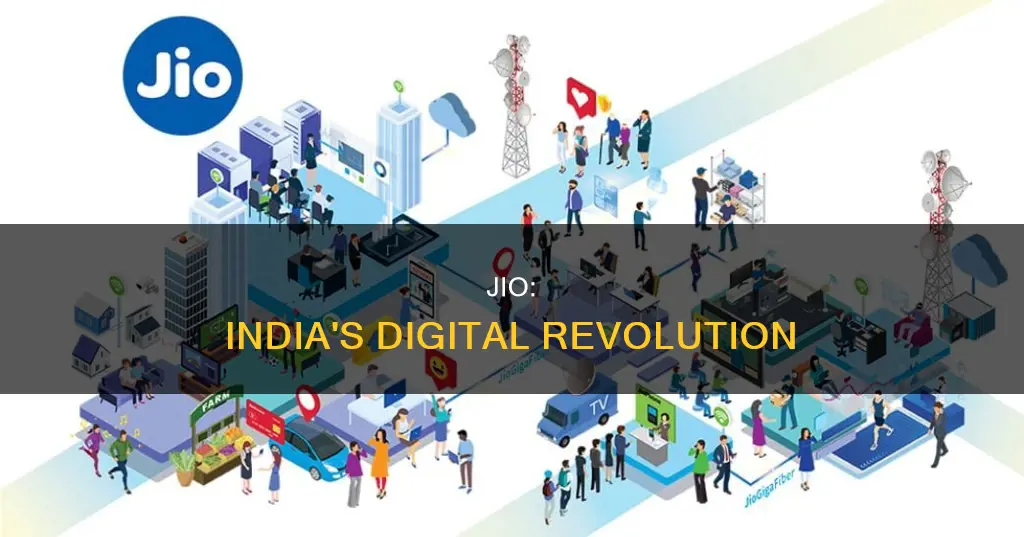
Jio Platforms, a subsidiary of Reliance Industries Ltd (RIL), has attracted a string of investments from technology giants and private equity firms. In less than a month, Jio has sealed $8 billion of investments from investors such as Facebook, Silver Lake, Vista Equity Partners, and General Atlantic. These investments will help RIL slash its debt and set a valuation for Jio, which has been largely owned by the billionaire conglomerate. Investors are attracted to Jio's access to India's huge consumer market and its potential to disrupt traditional industries in the country with its technology.
| Characteristics | Values |
|---|---|
| Investors | Facebook, Silver Lake, Vista Equity Partners, General Atlantic, Saudi Arabia’s $320 billion sovereign wealth fund |
| Investment Amount | $8 billion in the past month |
| Stake | Facebook: 9.99% to 10%, Silver Lake: 1.15%, Vista Equity Partners: 2.32%, General Atlantic: 1.34% to 2.2% |
| Investment Purpose | Slashing debt at Reliance Industries, setting a valuation for Jio, accessing India’s huge consumer market, shaking up traditional industries in the country |
What You'll Learn
- Investors are betting on Jio's access to India's huge consumer market
- Jio's potential to disrupt traditional industries with technology
- Facebook's investment in Jio is its biggest deal since buying WhatsApp
- Jio's contribution to India's rapid digital transformation
- Jio's ambitions to take on Amazon in e-commerce

Investors are betting on Jio's access to India's huge consumer market
Jio Platforms, a subsidiary of Reliance Industries Ltd (RIL), has been attracting a lot of investors lately. In April 2020, Facebook Inc. agreed to pay $5.7 billion for a 9.99% stake in the company, making it the largest minority shareholder in the Indian telecom network. Following Facebook, Silver Lake and Vista Equity Partners also invested a combined total of about $2.25 billion.
General Atlantic, a private equity firm, is also in talks to invest in Jio Platforms. The deal is expected to be worth $850 million to $950 million for a 1.34% stake. Saudi Arabia’s $320 billion sovereign wealth fund is also considering purchasing a minority stake in Jio.
Investors are betting on Jio’s access to India’s huge consumer market, which is the second-largest internet market in the world. Jio has contributed significantly to India's rapid digital transformation in recent years, bringing millions of Indians and small businesses online. With over 388 million subscribers, Jio is India’s largest carrier and has played a big role in disrupting traditional industries in the country, from retail to education and payments.
The recent investments in Jio Platforms will help the company gain the ability to compete with global e-commerce and digital payments behemoths such as Alphabet, Tencent, and Alibaba, who have already entered India’s vast, untapped open internet market. The investments will also help Jio expand its digital initiatives, which include Jio digital services (mobile, broadband), apps, tech capabilities (Artificial Intelligence, Big Data, IoT, etc.), and investments in companies like Den Networks, Hathway Cable, and Datacom Ltd.
Additionally, the investments will help RIL reduce its debt, which has surged in recent years due to Jio's aggressive expansion drive. RIL's chairman, Mukesh Ambani, has expressed his vision of transforming Jio into a digital society for India, and the investments received will help make that vision a reality.
Why People Avoid Investing
You may want to see also

Jio's potential to disrupt traditional industries with technology
Jio Platforms' unique experiment of co-opetition with global tech giants, combined with its local prowess, allows it to address an enormous market of price-sensitive customers. With its sheer scale, innovation, and unique collaborations, it can offer integrated solutions for retail, grocery, fintech, medical, agricultural, e-commerce, and e-payment needs, in addition to telecom services and home entertainment — at affordable prices.
Jio was launched as a "freemium" service, offering free internet services to price-sensitive Indian customers to increase the adoption rate and scale up the market. Previously, Indian customers, whose average income is about $150 per month, had never had access to such high-speed internet, bundled with so many apps and digital solutions, at such low prices.
Jio disrupted the Indian telecom market by launching its mobile telephony and data services in September 2016. Jio was considered an industry disrupter for its low data prices and for eliminating charges for domestic calls. Jio's pricing strategy sparked a tariff war, forcing incumbents such as Bharti Airtel, Idea Cellular, and Vodafone to slash their tariffs to maintain market share.
In addition to its pricing proposition, Jio's 4G network was technologically more sophisticated than other players in the Indian telecom market. The company's entire network and infrastructure were built from scratch with the latest technology and new infrastructure from leading telecom gear manufacturers. The company's huge digital infrastructure was designed to handle 5G and 6G.
Jio's disruptive pricing and technology have the potential to shake up traditional industries in India, from retail to education and payments.
Toxic People: Invest Time Wisely
You may want to see also

Facebook's investment in Jio is its biggest deal since buying WhatsApp
Facebook's investment in Jio is its biggest deal since it bought WhatsApp in 2014. The $5.7 billion deal sees Facebook take a 9.99% stake in Jio Platforms Limited, a subsidiary of Reliance Industries Limited, making Facebook the largest minority shareholder in the Indian telecom network.
Facebook's investment in Jio is a significant one for several reasons. Firstly, it underscores the company's commitment to India, a country that is in the midst of a dynamic social and economic transformation driven by the rapid adoption of digital technologies. In just five years, more than 560 million people in India have gained access to the internet, and Facebook has stated its intention to connect more people in the country through this deal.
Secondly, the investment provides Facebook with an opportunity to expand its reach in India, which is already its biggest market by user count. Facebook's core social network has over 300 million users in India, while its messaging service WhatsApp has over 400 million users.
Thirdly, the deal presents Facebook with a chance to finally monetise WhatsApp, which it acquired for $19 billion in 2014. While Facebook has introduced several key features to WhatsApp over the years, it has struggled to generate significant revenue from the platform. However, by partnering with Jio, Facebook can integrate WhatsApp with JioMart, Jio's small business initiative, to enable people to connect with businesses, shop, and purchase products seamlessly through their mobile devices.
Finally, the investment gives Facebook a powerful political ally in Mukesh Ambani, India's richest man and a close ally of Indian Prime Minister Narendra Modi. This could help Facebook navigate the regulatory landscape in India, where it has faced challenges in the past with its Free Basics program and the rollout of WhatsApp Pay.
In conclusion, Facebook's investment in Jio is a strategic move that not only strengthens its position in the Indian market but also provides new avenues for revenue growth, particularly through the monetisation of WhatsApp.
Young Investors: Who and How Many?
You may want to see also

Jio's contribution to India's rapid digital transformation
Jio has been instrumental in India's rapid digital transformation. The company, a subsidiary of Reliance Industries Limited, has built a world-class all-IP data network with advanced 4G LTE technology. Jio's LTE network has brought about a radical digital revolution in India, with the goal of paving the way for a fully digital India.
Jio's network is the only one conceived as a Mobile Video Network from the ground up, supporting Voice over LTE technology. It is future-proof and can be easily upgraded to support more data as technologies advance to 5G, 6G, and beyond. Jio has transformed the Indian telecom landscape by offering free voice calls for its customers across India, making India the highest-quality, most affordable data market in the world.
Jio has amassed over 200 million subscribers in the last two years, providing low-cost and easy access to data across India, even in rural areas. This has helped bridge the rural-urban digital divide, with Jio's chairman, Mukesh Ambani, referring to their innovations as providing 'digital oxygen' to the country.
Jio has also partnered with Samsung Electronics to bring LTE coverage to 99% of the Indian population and improve network capacity across the country. Additionally, they have deployed a nationwide cellular IoT network, the first of its kind in India, which will support various consumer and enterprise use cases, including vehicle tracking, smart appliances, and security.
Jio's focus on digital transformation extends beyond telecommunications. They have partnered with Microsoft Corp. to offer small and medium-sized enterprises (SMEs) a range of solutions, including connectivity, computing, storage, data analytics, AI, and blockchain. Jio is also investing in startups and offering cloud infrastructure for free to budding startups, with Ambani expressing his passion for transforming India into an 'AI-first economy'.
Jio's contributions have been recognised, topping Fortune's 'Change the World' list, which acknowledges business leaders who have successfully used the profit motive to tackle social problems and contribute to society's betterment.
Homes: The Ultimate Investment?
You may want to see also

Jio's ambitions to take on Amazon in e-commerce
JioMart, Reliance's online shopping portal, is at the forefront of this battle. Launched in 2020 as a grocery-ordering app during the lockdown, JioMart has since expanded into a full-fledged e-commerce platform offering a wide range of products, including home appliances, fashion, electronics, and beauty products. JioMart's unique offline-online hybrid model, leveraging Reliance's 15,000 retail stores and neighbourhood mom-and-pop outlets, has helped it gain a foothold in the market.
One of JioMart's biggest strengths is its integration with WhatsApp, which provides easy access to its existing 400 million users in India. This integration has the potential to drive a significant number of orders and customers to JioMart. Additionally, JioMart's focus on niche product categories like groceries, where Reliance already has a strong presence, has helped it establish itself in the highly competitive e-commerce space.
The success of Jio's previous ventures, such as its wireless carrier, Jio Infocomm, which disrupted the telecom market in India, demonstrates Ambani's ability to execute his ambitious plans. With Jio, he aims to "completely transform" India's unorganized retail market and create a digital platform that connects producers, traders, small merchants, consumer brands, and consumers.
The investments in Jio reflect the confidence of global investors in the company's ability to disrupt the market and its potential for growth in India's massive consumer base. This support will be crucial as Jio takes on established e-commerce giants like Amazon and Walmart in the coming years.
Rich People's Investment Secrets
You may want to see also
Frequently asked questions
Jio has access to India's huge consumer market and has the potential to disrupt traditional industries in the country with its technology.
The string of investments will help Reliance Industries slash its debt and set a valuation for Jio.
Facebook Inc. agreed to pay $5.7 billion for a 10% stake in Jio, while Silver Lake and Vista Equity Partners invested a combined $2.25 billion.







